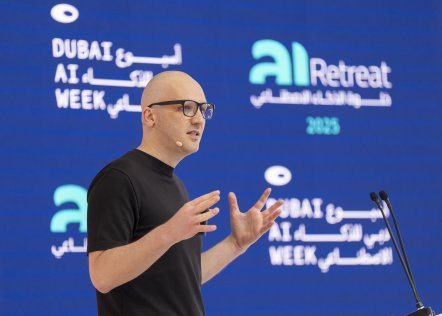
Dubai — A senior executive from Sony has revealed how the company launched a global AI talent recruitment drive to develop Gran Turismo Sophy—a superhuman racing AI agent that mastered the PlayStation game Gran Turismo Sport.
Speaking at the Dubai AI Retreat in a session titled ‘Why Innovation Starts with Mindset, Not Tech’, Michael Spranger, President of Sony AI Inc, highlighted what it takes at the organisational level to achieve breakthroughs like Gran Turismo Sophy.
“When I think about transformation,” he said, “it is really about building the infrastructure, platform, and data to enable innovation—not just for six months, but for the next five to ten years.”
Spranger explained that while developing GT Sophy, Sony built an entire computational system to train agents across any PlayStation game. “The people who developed it did not exist before. We had to go out and hire the best talent. We even overhauled Sony’s entire HR and compensation policies to drive this transformation. All of this was part of making Sony an AI-first company.”
He added: “My theory of change is leading by example—driving internal momentum through landmark breakthroughs and building confidence across the company. It is a journey worth taking.”
The Global Age of Research
In another session titled ‘Accelerating AI Innovation for Global Impact’, Yossi Matias, Vice President and Head of Google Research, discussed AI’s potential to solve some of the world’s most pressing societal challenges.
“The opportunities ahead are immense,” he said. “It is about advancing research, innovation, and technology, especially by opening it up to partnerships.”
He introduced the concept of a “magic cycle of research”, a dynamic interplay between technological progress and real-world impact. “We are now in a time where this cycle moves faster than ever before. What used to take years as a PhD now takes months—and the scale is only growing. I would say we have entered a true global age of research.”
High-Level Roundtables on AI Enablers
The Dubai AI Retreat also hosted a series of strategic roundtables. Under the theme “ Economy & Investment”, the first roundtable explored how AI can enhance Dubai’s economic competitiveness and attract foreign direct investment (FDI). Participants discussed strategies to boost productivity, foster AI entrepreneurship, and position Dubai as a global AI innovation hub, including ambitions to create 10 AI unicorns by 2030 across sectors such as logistics, fintech, and green energy. They also examined policy tools like tax incentives and agile regulations to support AI-driven FDI.

“Data & Governance” roundtable addressed the future of ethical AI governance, adaptive regulation, and secure data ecosystems. Discussions included cross-border data sharing, incentivising private sector collaboration, and anticipating regulatory challenges over the next decade.
Held under the theme “Infrastructure”, the third roundtable highlighting Dubai’s approach to sustainable AI, including investments in eco-friendly data centres, the rise of edge computing, and the infrastructure needed to meet growing computational demands.
Finally, the “Talent Development” roundtable focused on building a world-class, inclusive AI workforce while preserving cultural identity. Topics included global talent attraction, lifelong learning, and leveraging AI to promote Arabic language and cultural heritage.
The AI Retreat is held on 21 April 2025 at the Museum of the Future as part of Dubai AI Week. The week-long event is organised by the Dubai Centre for Artificial Intelligence (DCAI), an initiative of Dubai Future Foundation (DFF), and held under the patronage of His Highness Sheikh Hamdan bin Mohammed bin Rashid Al Maktoum.
Dubai AI Week brings global experts, entrepreneurs, regulators, policymakers, investors, and major technology companies, to showcase Dubai’s vision for the future of AI, harnessing its transformative potential in line with the Dubai Universal Blueprint for Artificial Intelligence. It seeks to empower organisations and individuals to explore the capabilities of AI across various sectors.





